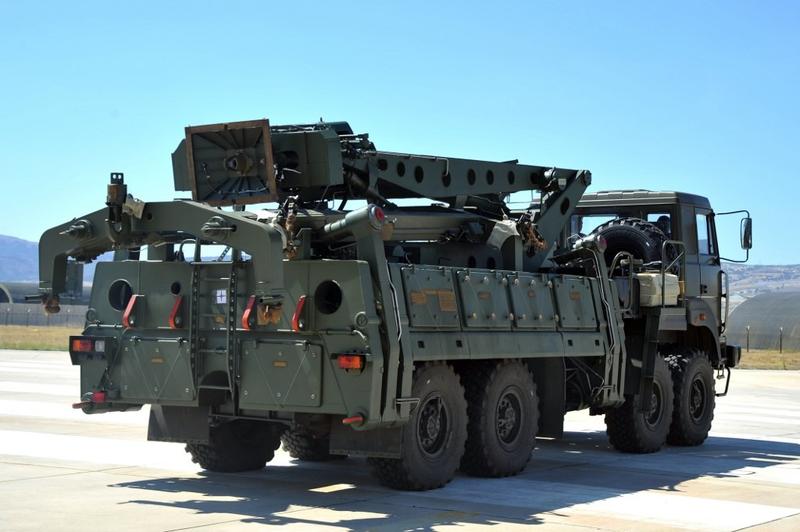 This handout picture taken and released on Aug 27, 2019 by the Turkish Defence Ministry shows a part of the S-400 missile defense system after it was unloaded from a Russian cargo plane, at the Murted military airbase, northwest of Ankara. (PHOTO HANDOUT / TURKISH DEFENCE MINISTRY / AFP)
This handout picture taken and released on Aug 27, 2019 by the Turkish Defence Ministry shows a part of the S-400 missile defense system after it was unloaded from a Russian cargo plane, at the Murted military airbase, northwest of Ankara. (PHOTO HANDOUT / TURKISH DEFENCE MINISTRY / AFP)
Demands from the US Congress that Turkey give up its Russian-made air-defense capability before ties can improve were counterproductive and mask more serious flashpoints that must be resolved, President Recep Tayyip Erdogan’s spokesman said.
“They are presenting the S-400, the removal of the S-400, as a precondition and that’s simply not acceptable,” Ibrahim Kalin said in an interview Saturday.
The US and Turkey have been allies for more than six decades, but in recent years their relationship has been strained by disputes. Turkey’s purchase of the Russian missile system -- which the US contends could help Moscow gather critical intelligence on NATO military projects including the F-35 fighter jet -- is the source of the most recent conflict.
They (the US) are presenting the S-400, the removal of the S-400, as a precondition and that’s simply not acceptable.
Ibrahim Kalin, Spokesman for Turkish President Recep Tayyip Erdogan
ALSO READ: Turkey begins testing missile radars at heart of row with US
Activation of the advanced S-400s delivered last year has taken longer than planned, leaving some observers to conclude that Erdogan wants to avoid planting Turkey into the raw politics of President Donald Trump’s re-election fight. Yet Kalin put the delay down to the COVID-19 pandemic, saying “the process is still going on. There is no reversal of that decision.”
Under its missile deal, Moscow is due to transfer technology enabling Turkey to co-produce a second S-400 battery, Kalin said. Russia on Sunday said it may sign a new S-400 agreement with Ankara in 2021, according to Interfax.
The White House has resisted growing pressure from both parties in Congress to exact retributions on Turkey, which hosts key NATO installations, over its S-400 purchase. But bipartisan legislation approved by the House of Representatives last month calls for sanctions.
Kalin said that, instead, the US should focus on the “main issues” troubling relations, including US support to Kurdish YPG forces in Syria who have links to separatist militants Turkey and the European Union consider terrorists; Washington’s refusal to extradite Fethullah Gulen, the Turkish cleric living in exile in Pennsylvania whom Erdogan accuses of orchestrating a failed 2016 coup; and a US prosecution of one of Turkey’s largest banks.
“Policy makers in Washington, as well as others, need to understand how serious these issues are for Turkey,” Kalin said.
Erdogan and Trump have talked up their personal chemistry amid the many disagreements and say they can work together. But that hasn’t prevented regular spats.
Biden video
US Senator Lindsey Graham, a South Carolina Republican and Trump confidant, said in June that for Turkey and the US to build closer trade ties in the face of new challenges, they must first resolve the missile issue.
Graham cited Africa, where Turkey is involved in the war in Libya and shares with the US a concern over Russia’s influence. Erdogan has cultivated ties with dozens of African nations during his almost two decades in power.
READ MORE: Erdogan says he and Trump agreed 'some issues' on Libya
Turkey may now be bracing for a rough ride if Democratic presidential nominee Joe Biden is elected in November. Biden last week created a furor in Turkey when a December video surfaced of him calling for support for Turkish opposition parties to defeat Erdogan at the ballot box.
“The date of his remarks is a secondary issue, what is important is whether he said it or not,” Kalin said. “Until now, we did not hear any statement from him aimed at fixing this.”


